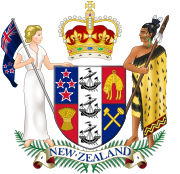- Copyright (Infringing File Sharing) Amendment Act 2011
-
Copyright (Infringing File Sharing) Amendment Act 2011 
Parliament of New ZealandLong title/
Purpose' Dates Date of Royal Assent 18 April 2011 Commencement 1 September 2011 Other legislation Amendments Copyright Act 1994 Status: Current legislation The Copyright (Infringing File Sharing) Amendment Act 2011, also known as Skynet law, is an Act of the Parliament of New Zealand which amends the Copyright Act 1994.
Contents
Legislative history
The Copyright (Infringing File Sharing) Amendment Bill 2010, or Bill 119–1, was introduced to parliament on 23 February 2010. The Bill had its first reading and was referred to Commerce Committee on 22 April 2010. On 3 November 2010 the Commerce Committee reported on the Bill, then Bill 119–2. On 12 April 2011 the Bill had its second reading, committee of the whole House and third reading. The Bill received royal assent on the 18 April 2011 and became an Act of Parliament.[1]
The Bill was passed "under urgency".[2]
Amendments to Copyright Act 1994
The Copyright (Infringing File Sharing) Amendment Act 2011 repeals section 92A of the Copyright Act 1994. Section 92A was enacted by section 53 of the Copyright (New Technologies and Performers Rights) Amendment Act 2008 and would have required Internet Service Providers (ISPs) to adopt a process for disconnecting the internet access of subscribers suspected of repeat copyright infringement. Section 92A was criticised by civil liberty groups, academics and lawyers. As a result of the controversy section 92A was implemented.[2]
Graduated response provisions
The Copyright (Infringing File Sharing) Amendment Act 2011 provides for what is known as graduated response. Under the Act copyright owners notify fixed-line ISPs (the Act does not apply to mobile networks until 2013) that they believe a internet subscriber is infringing their copyright through peer-to-peer filesharing, the ISPs in turn send warning notices to the relevant subscribers, and after three such warnings the copyright owner may take their case to the Copyright Tribunal. The Copyright Tribunal can impose a maximum $15,000 penalty on the Internet subscriber. The Act has extended the jurisdiction of the Copyright Tribunal for this purpose and the stated aim of the Act is to provide a "fast track, low cost process" to deal with allegations of copyright infringement through peer-to-peer filesharing.[2]
When the Bill was originally introduced to parliament it provided that a District Court could order the disconnection of internet subscribers for up to six months in certain circumstances. This provision has been amended and the new section 122PA provides that internet subscribers can not be disconnected until an Order in Council is made by the Governor General on the recommendation of the Justice Minister. It is anticipated that disconnection of internet subscribers will be considered in 2013, as part of the five year review of the amendments to the Copyright Act 1994 made in 2008.[2]
Criticism
A UN report argued that “three strikes” laws that deprive alleged copyright infringers of Internet access violate human rights. Sweden made remarks at the UN Human Rights Council that endorsed many of the report’s findings, including the criticism of “three strikes” rules. The statement was signed by 40 other nations, including the United States and Canada. The United Kingdom and France, two nations that have enacted “three strikes” regimes, did not sign the statement.[citation needed]
On 27 August, 2011, protesters demonstrated against the Act in Auckland.[3][4]
Supporters
The graduated response as implemented by the Copyright (Infringing File Sharing) Amendment Act 2011 was supported by the New Zealand Federation Against Copyright Theft (NZFACT) and the Motion Picture Association of America which is active in New Zealand. They argued that existing civil and criminal provisions copyright infringement are ineffective.[2]
See also
References
- ^ "Copyright (Infringing File Sharing) Amendment Act 2011 No 11 – Legislative History". legislation.govt.nz. http://www.legislation.govt.nz/act/public/2011/0011/latest/DLM3331813.html. Retrieved 17 May 2011.
- ^ a b c d e Claire Deeks (14 April 2011). "Controversial Copyright (infringing file sharing) Amendment Bill passes into law". James & Wells Intellectual Property. http://www.jaws.co.nz/news/2011/4/14/controversial-copyright-(infringing-file-sharing)-amendment-bill-passed-into-law.aspx. Retrieved 17 May 2011.
- ^ Victoria Robinson (August 27, 2011). "Protesters block off Queen Street". AucklandNOW - stuff.co.nz. http://www.stuff.co.nz/auckland/local-news/5518142/Protesters-block-off-Queen-Street. Retrieved August 27, 2011.
- ^ "Small gathering for protest at copyright". The New Zealand Herald. August 27, 2011. http://www.nzherald.co.nz/nz/news/article.cfm?c_id=1&objectid=10747780. Retrieved August 27, 2011.
External Links
Categories:- New Zealand Statutes
- Copyright law
- New Zealand government stubs
Wikimedia Foundation. 2010.
